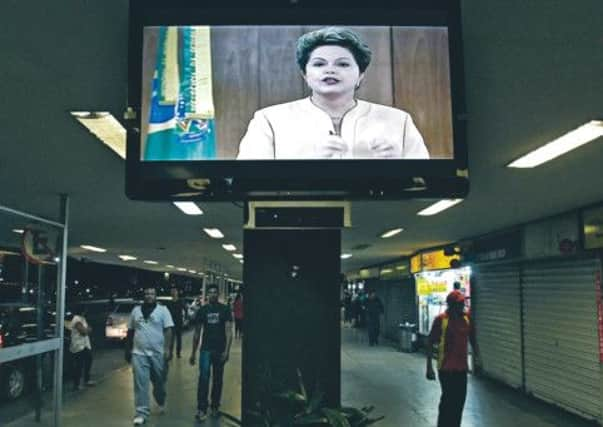Brazil protests: Rousseff vow to battle corruption


In a ten-minute address on peak-time television on Friday she ended her much-criticised silence after more than a week of sometimes violent demonstrations, which are expected to continue today.
She said she planned to meet with protest leaders, governors and city mayors. However, it remained unclear who would represent the various groups of protesters who have taken to the streets to vent their anger over a range of grievances, including poor public services, increasing costs and high taxes.
Advertisement
Hide AdAdvertisement
Hide AdRousseff said that her government would create a national plan for public transport in Brazil’s cities. Civic officials have already backed down from increasing bus and subway fares, a move which sparked the protests.
She also reiterated her backing for a plan, before congress, to invest oil revenues in education and to implement a pledge to bring in foreign doctors to parts of the country which lack medical services.
“I want institutions that are more transparent, more resistant to wrongdoing,” Rousseff said in reference to complaints of deep corruption in Brazilian politics, which is emerging as a focus of the protests. “It’s citizenship and not economic power that must be heard first.”
Rousseff is a Marxist rebel, known by her nom de guerre, Stella, who fought against Brazil’s 1964-85 military junta and was imprisoned for three years and tortured. She pointedly referred to earlier sacrifices made to free the nation from dictatorship in her address.
“My generation fought a lot so that the voice of the streets could be heard,” she said. “Many were persecuted, tortured and many died for this. The voice of the street must be heard and respected and it can’t be confused with the noise of some troublemakers.”
Edvaldo Chaves, a 61-year-old doorman in Rio’s prosperous Flamengo neighbourhood, said he believed Rousseff’s heart was in the right place.
“I thought she seemed calm and cool. Plus, because she was a guerrilla and was in exile, she talks about the issue of protests convincingly,” Chaves said. “I think things are going to calm down. We’ll probably keep seeing people in the streets but probably small numbers now.”
But Bruna Romao, an 18-year-old shop assistant in Sao Paulo, said Rousseff’s words probably wouldn’t have an impact.
Advertisement
Hide AdAdvertisement
Hide Ad“Brazilians are passionate,” she said. “We boil over quickly but also cool down fast. But this time it’s different, people are in full revolt. I don’t see things calming down anytime soon.”
Around one million anti-government demonstrators took to the streets nationwide on Thursday night to denounce everything from poor public services to the billions of pounds spent preparing for next year’s World Cup football tournament and the 2016 Olympics.
The protests continued yesterday morning, as about 1,000 people marched in the west of Rio de Janeiro. Some shops were looted and a £150 million arts centre, which has lain empty for years since it was built, was occupied. Police tried to disperse the crowd with tear gas. Protesters threw stones. Police claimed some in the crowd were armed and firing at officers.
Other protests broke out in Sao Paulo, Brazil’s largest city, where traffic was paralysed but no violence was reported, and in Fortaleza in the north-east. There were calls for street protests in ten cities today.
With Pope Francis scheduled to visit Brazil next month, the National Conference of Brazilian Bishops issued a statement expressing “solidarity and support for the demonstrations, as long as they remain peaceful”.
“This is a phenomenon involving the Brazilian people and the awakening of a new consciousness,” the Catholic leaders said. “The protests show all of us that we cannot live in a country with so much inequality.”
Rousseff had never held elected office before she became president in 2011 and remains uncomfortable in the spotlight. A career technocrat and economist, she was helped into the presidency by her mentor, the popular former president Luiz Inacio Lula da Silva.
Marlise Matos, a political science professor at the Federal University of Minas Gerais, said before Rousseff spoke that officials needed to take stronger action.
Advertisement
Hide AdAdvertisement
Hide Ad“The government has to respond, even if the agenda seems unclear and wide open,” she said. “It should be the president herself who should come out and provide a response. But I think the government is still making strategic calculations to decide how to respond. What I’d like to see is a call for a referendum on political reform. Let the people decide what kind of system we have.”
Social media and mass e-mails were buzzing with calls for a general strike next week. However, Brazil’s two largest unions, the Central Workers Union and Union Force, said they were not involved in planning such action.
A Thursday night march in Sao Paulo was the first with a strong union presence, as a drum band led members wearing matching shirts down the city’s main avenue. Many protesters have called for a movement with no ties to political parties or unions, which are widely considered corrupt.
The unrest comes as Brazil, a nation of 194 million people, hosts the Confederations Cup football tournament, with tens of thousands of foreign visitors in attendance.
Carlos Cardozo, a 62-year-old financial consultant who joined the protest in Rio, said he thought the unrest could cost Rousseff next year’s elections. Even as recently as last week, Rousseff had enjoyed a 74 per cent approval rating in a poll by the National Transport Confederation business group.
“Her paying lip service by saying she’s in favour of the protests is not helping her cause,” Cardozo said. “People want to see real action and it’s not this government that’s capable of delivering.”
SEE ALSO: